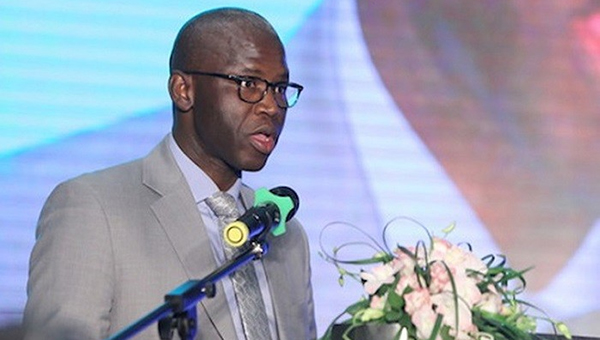
Politburo member and Secretary of the HCM City Party Committee Nguyen Thien Nhan speaks at the event. (Photo: VGP)
Experts gathered at the seminar held by the HCM City People's Committee and the World Bank in Vietnam to exchange international experience in mobilising social capital and promoting PPP in selected sectors in the southern economic hub.
Delegates focused on sharing experiences on PPP and private capital mobilisation strategy. In particular, they discussed investment privatisation on three fields of solid waste treatment, wastewater treatment and flood control; the health sector; and education.
The Vietnamese government should ensure all stakeholders reap benefits from the public private partnership (PPP) as the country is seeking to revamp its legal framework to lure funds into much-needed infrastructure, according to a World Bank (WB) official.
Although PPPs have proven to be a very successful framework to help governments provide the much-needed infrastructure to underpin future economic growth, as well as provide broader social benefits, it does not mean PPPs are always successful in these countries nor in all sectors, World Bank Vietnam Country Director Ousmane Dione said at a workshop on PPP in Ho Chi Minh City (HCMC).
“Failures have happened, and we have learnt that for PPPs to be a success, there must be a recognition that this is a long-term partnership, where both the public and private sectors need to share not only rewards but also risks. As with any partnership, if the risks and rewards are not shared fairly, then it is very likely that the partnership will fail,” Dione noted.
The legal, regulatory and institutional frameworks also need to be clear and robust to enable investors to accept risks over the longer term with some certainty of the framework within which these risks are being taken, he added.
The World Bank and several development partners stand ready to support Vietnam to bring in global experience, expertise, knowledge and financing on this agenda, Dione said.
Taking HCM City as an example, he said the city is a rapidly urbanizing mega-city and an emerging economic powerhouse in the Southeast Asia region, counted as among the country’s most attractive destinations for foreign direct investments.

World Bank Vietnam Country Director Ousmane Dione.
In order to maintain its economic competitiveness and meet the challenges stemming from an ageing demographic, HCMC will require further investments in infrastructure especially in areas like transport, health, education and the environmental sectors.
Like most cities across the world, public investment alone will not be sufficient to meet the large infrastructure and service delivery needs of Ho Chi Minh City. Therefore, he stressed the need to improve the efficiency of its public investment and work towards leveraging more from the private sector. “If Ho Chi Minh City succeeds, it will set the path for the overall development of cities in Vietnam.”
It is expected that the city needs a total social investment capital of about over VND1.8 quadrillion (US$77.4 billion) during the 2016-2020 period (an average increase of 8.4% annually), an increase of 53.3% compared to the 2011-2015 period. Of which, the investment capital from the State sector is expected to account for VND376.2 trillion, leading to the need for investment capital from outside the State sector for the city’s socio-economic development.
Speaking at the seminar, Politburo member and Secretary of the HCM City Party Committee Nguyen Thien Nhan emphasised that the city needs capital for socio-economic development, in which the PPP is among the available channels to mobilise capital.
In the implementation of PPP models, the concerned agencies and units need to pay attention to beneficiaries, as well as affected objects (people with their land recovered to implement the projects), Nhan suggested.
The country director pointed out that for year, the Vietnamese government has introduced several regulations to promote private sector investment in infrastructure, service delivery, and equipment provision. However, despite some successes, notably in transport and energy sectors, private sector investment to-date has still been relatively low.
To deal with constraints and ensure clear rules of engagement, transparency in bidding and procurement and appropriate risk sharing arrangements between the public and private sectors, the government is now currently drafting a new PPP law which will consolidate all the PPP related legislation under one law, and therefore provide a comprehensive and enabling regulatory framework to facilitate PPP projects successfully.
He also noted that in order to effectively implement PPP projects, the city's authorities should proactively propose specific groups and areas to call for investment.


















